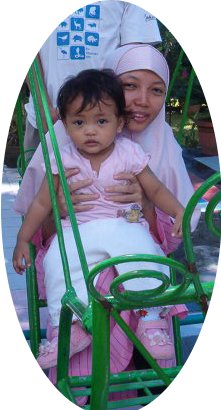Khonsa already 2 years old, it’s time for weaning. Why 2 years ?
Because Al Qur’an surah Al Baqoroh : 233, said :


The mothers shall give suck to their offspring for two whole years, if the father desires to complete the term. But he shall bear the cost of their food and clothing on equitable terms. No soul shall have a burden laid on it greater than it can bear. No mother shall be Treated unfairly on account of her child. Nor father on account of his child, an heir shall be chargeable in the same way. If they both decide on weaning, by mutual consent, and after due consultation, there is no blame on them. If ye decide on a foster-mother for your offspring, there is no blame on you, provided ye pay (the mother) what ye offered, on equitable terms. But fear Allah and know that Allah sees well what ye do.
There’s alot of myth about wean, for example :
MYTH: My baby weaned himself at an early age.
FACT: The full natural course of breastfeeding was designed to continue a year or more. Yet, it’s not uncommon for a woman to report that her baby “weaned himself” at four months or at seven months, for no apparent reason. Although these mothers might have liked to nurse longer, their babies just didn’t cooperate. I am convinced that the usual common denominator in these cases of early weaning is insufficient milk and the regular use of formula supplements. When the production of breast milk diminishes and formula is readily available by bottle, many babies will develop a preference for bottle-feeding and progressively lose interest in nursing. I believe that few babies naturally wean before nine to twelve months if they are nursed at will, consume most or all of their milk from breastfeeding, and if the mother’s milk supply is adequate. We may hear, “My baby just lost interest in breastfeeding and weaned himself before six months,” but all too often excessive use of bottles and low milk production turn out to be the culprits behind premature weaning.
MYTH: Babies can’t breastfeed once they have teeth.
FACT: I once conducted a survey among about 250 newly delivered adolescent mothers who planned to breastfeed. In response to a question about how long they intended to nurse their babies, the most frequent reply was “until he gets teeth.” The common assumption prevails that teeth make it impossible, even hazardous to the mother, for an infant to breastfeed. While a teething infant certainly can bite her mother’s nipple, most breastfed infants quickly learn not to bite. Even babies with all twenty primary teeth can nurse without causing their mothers discomfort.
MYTH: He’s too old to still be nursing.
FACT: Most Americans have acquired a certain comfort level with the image of the tiny, helpless newborn taking her life-sustaining nutrition at her mother’s breast. As stated earlier, it’s an entirely different matter when an active toddler scrambles onto his mother’s lap, pulls at her buttons or lifts her blouse, and announces insistently, “Nummie, nummie.” Women who nurse older babies often encounter rebuke and criticism: “I can’t believe you’re still doing that.” “Do you plan to have him come home from kindergarten to nurse every day?” If you are the recipient of such barbs, please ignore them, trust your own heart, and know that you are doing the right thing for your baby when you allow her to wean at her own pace. Insist that you are following the doctor’s advice (mine) and inform your critics that the American Academy of Pediatrics endorses nursing beyond a year. Believe that by meeting your child’s dependency needs now, you will foster even greater independence later.
MYTH: Everything will be better when you wean.
FACT: Having a baby changes your life dramatically. Your commitments and priorities change. Your body changes. Sleep deprivation sometimes leaves you tired and discouraged. Your relationship with your spouse is renegotiated. Breastfeeding may bring temporary physical complaints like nipple soreness and breast tenderness. Perhaps as a result of the highly visible changes that accompany lactation and the intimacy of the nursing dyad, breastfeeding sometimes takes the rap for more than its share of the disruptions and adjustments that accompany the arrival of a new baby in the family.
Women with a wide-ranging spectrum of postpartum complaints for which medicine has no easy answers have been advised to wean, as if breastfeeding were the sole explanation for a new mother feeling fatigued, or a new father feeling left out, or a newborn being fussy. Weaning has been recommended to countless women, not only as the solution to frustrating lactation difficulties like cracked nipples or a breast infection, but as the answer to such divergent complaints as exhaustion, depression, marital conflict, sibling jealousy, illness in the mother, and even a painful episiotomy! After such ill-advised weaning, mothers discover the reality that babies still need to be fed and cared for, new fathers and siblings still feel displaced at times, fatigue and exhaustion still accompany sleep deprivation, young babies still fuss, and other parts of your body still ache from time to time. I urge you not to view weaning as a cure-all for the common ailments and discouragements of new parenthood. What you just might find out is that relinquishing the joy of breastfeeding gains you nothing, while adding resentment to your list of complaints.
And I got this article about Weaning tips :
Highlights :
Snack vs. breast
Let your child lead the way
Change bedtime routines
Introduce the cup
Avoid familiar nursing positions and places
Take it slow
Tricks for the family bed
A recipe for weaning
Pros and cons of going cold turkey
Happy weaning ! 🙂



Recent Comments